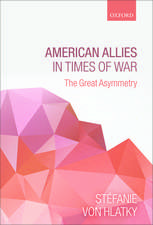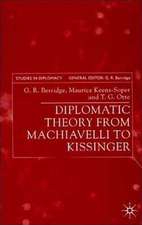Negotiating Environment and Science: An Insider's View of International Agreements, from Driftnets to the Space Station
Autor Richard J. Smithen Limba Engleză Paperback – 2 mar 2012
| Toate formatele și edițiile | Preț | Express |
|---|---|---|
| Paperback (1) | 228.89 lei 43-57 zile | |
| Taylor & Francis – 2 mar 2012 | 228.89 lei 43-57 zile | |
| Hardback (1) | 437.98 lei 43-57 zile | |
| Taylor & Francis – 15 oct 2009 | 437.98 lei 43-57 zile |
Preț: 228.89 lei
Nou
Puncte Express: 343
Preț estimativ în valută:
43.80€ • 45.56$ • 36.16£
43.80€ • 45.56$ • 36.16£
Carte tipărită la comandă
Livrare economică 14-28 aprilie
Preluare comenzi: 021 569.72.76
Specificații
ISBN-13: 9780415505482
ISBN-10: 0415505488
Pagini: 192
Dimensiuni: 138 x 216 x 10 mm
Greutate: 0.23 kg
Ediția:1
Editura: Taylor & Francis
Colecția Routledge
Locul publicării:Oxford, United Kingdom
ISBN-10: 0415505488
Pagini: 192
Dimensiuni: 138 x 216 x 10 mm
Greutate: 0.23 kg
Ediția:1
Editura: Taylor & Francis
Colecția Routledge
Locul publicării:Oxford, United Kingdom
Public țintă
Academic and Professional Practice & DevelopmentNotă biografică
Richard J. Smith was the principal deputy assistant secretary in the Department of State‘s Bureau of Oceans and International Environmental and Scientific Affairs from 1985 to 1994. Following this, he worked for several years on global issues in the National Intelligence Council (NIC). He has received numerous awards including two presidential honors and the State Department's Distinguished Honor Award, as well as several Superior Honor Awards.
Recenzii
'This is a wonderfully readable account of lessons learned from eight difficult negotiations...When and if the United States is ready to go beyond the limited climate change understandings reached in Copenhagen last December, lead U.S. negotiator Todd Stern and his colleagues can profit from reviewing Smith's lessons--as, indeed, can all readers with an interest in the increasingly important role that science and environmental negotiations play in the preservation of our planet.'Foreign Service Journal'A timely and exceedingly relevant contribution to the literature of government and political science. Smith examines, in refreshingly non-academic and jargon-free style, a fascinating new aspect of modern diplomacy.'Richard E. Benedick, author of Ozone Diplomacy'The book has important insights that deal with the negotiation process and how broader politics impact negotiations. Smith‘s section on Kyoto at the end of the book is right on and should be taken seriously by future negotiators.'Alan D. Hecht, Director for Sustainable Development, U.S. Environmental Protection Agency (EPA)'An interesting and important book about a topic now on the front burner.'George P. Shultz, former U.S. secretary of state (1982-89) and current distinguished fellow at Stanford University's Hoover Institution'How do we get agreement on the difficult environmental and scientific challenges the world faces today? This well-written and fascinating account of eight negotiations provides many useful answers.'Joseph S. Nye, Jr., University Distinguished Service Professor, Harvard University, and author of The Powers to Lead'A powerful pick for any political science or science library.'California Bookwatch
Cuprins
About the Author Foreword, by Richard E. Benedick Preface Acknowledgments 1. Earth‘s Ozone Shield 2. The Driftnet Dilemma 3. Acid Rains on Canadian-U.S. Relations 4. Caribou in the Oil Patch 5. The U.S.-USSR Science Agreement 6. Space Station Partnership 7. Human Rights and the Environment 8. Fishing in the Donut Hole 9. On Finding Common Ground Notes Index
Descriere
In this thought-provoking new book, career U.S. State Department negotiator Richard J. Smith offers readers unprecedented access to the details about some of the most complex and politically charged international agreements of the late and immediate post Cold War era. During his nine years as Principal Deputy Assistant Secretary in the Bureau of Oceans and International Environmental and Scientific Affairs, Smith led U.S. negotiations on many significant international agreements. In Negotiating Environment and Science, Smith presents first-hand, in-depth accounts of eight of the most high-profile negotiations in which he was directly involved. Written for an audience with a general interest in environmental issues as well as international relations, Negotiating Environment and Science will also be an important resource for historians, political scientists, and students in international law and diplomacy.











